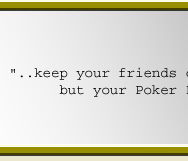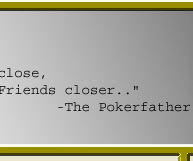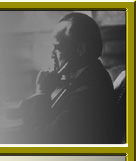Copyright 2009 Full
Tilt Poker
April 15th, 2009
(View all Online
Poker Lessons)
Poker Lesson: Climbing on the HORSE
Author: Ali Nejad
I'm aware that most poker players know me primarily as a poker commentator on shows like NBC's "Poker After Dark" and "National Heads-Up Poker Championship", but I also happen to be a pretty serious Limit Hold ‘em and mixed game player. I particularly enjoy HORSE, so I thought I'd give one quick tip on each of the five games to help players who are beginning to explore this challenging format.
Hold 'em: Because HORSE involves three Stud games and only two flop games, most HORSE players have solid Stud backgrounds as opposed to flop-game backgrounds. As such, they tend not to play the Hold 'em round as well. When you've identified who the softer flop-game players are, try to attack their blinds more than the average player and with a wider range of hands. They'll often either lay down preflop, or check-fold if they call and miss the flop - something more experienced Hold 'em players are much less likely to do. Playing aggressively against these opponents and exploiting their weak-tight play is profitable.
Omaha Hi/Lo: What you want in split-pot games are situations involving three or more players (this applies to Stud Hi/Lo as well). If you're going to split the pot, you don't want to split just your money and what the guy you played against put in; you want to split someone else's money. That's the only way you're going to make a real profit without scooping. Try limping in as opposed to raising with A-2-X-X in ring games when the Ace is unsuited and/or your other two cards are disconnected (e.g. A-2-7-K offsuit). In short-handed games or in late position it's a different story, but mixing up the way you play A-2 preflop can help to conceal your hand, and allow for easy folds on high-card flops. Also, avoid mid-range pairs. They play awful, and even when you hit a set you'll often be outdrawn by straight and flush draws or just hanging on for only half the pot.
I'll give you an example from a HORSE game on Full Tilt Poker where I had a potentially huge hand and wanted to invite more people into the pot. I had Ah-4h-7d-6c. I limped from middle position, there was a raise from the small blind, I called, and we saw the flop four-handed. The flop came 2h-3h-Kc, a huge flop that gave me the nut low-draw, a nut flush-draw, and a gut-shot nut straight draw. The small blind bet and the guy to my right folded. This flop was too big to raise, so I called, hoping the player on the button would come along. If I hit my hand, I wanted more players in the pot. As it turned out the button raised, the small blind called, and being 3 handed, it made sense for me to re-raise such a big draw, so I did and both of my opponents called.
The turn was a blank high card and we checked around, (something the 3rd bet I put in on the flop likely allowed to happen), but the river was my dream card, the 6h, giving me the nut low and the nut flush which, with no pair on board, was the nut high as well. I got all sorts of action from both players and we eventually capped the pot. The button held a weaker flush, and the small blind just had A-4 to halve the low, so I won three-quarters of a large pot. As a beginner in Omaha Hi/Lo, in a multi-way pot you should have at least a reasonable shot at winning both the high and low if you're going to do any raising on the river. Otherwise even with the nut Hi or Lo, just bet and then call if raised to prevent being quartered.
Razz: My key Razz advice is not to overplay any hand initially and not chase. Even when you have A-2-3 to start, the best possible hand, I favor raising and only calling if someone does any re-raising (which also helps conceal your starting hand). Being a favorite on 3rd street doesn't mean too much in Razz because what's most important is hitting a better 4th street card than your opponent and playing the strength of your board. Don't be afraid to check-fold marginal low draws on 4th street if you hit a brick and your opponent is showing two cards lower than your highest card. (e.g. your hole cards are 2-8 and your board is 6-K while your opponent shows 7-6) You'll generally be playing catch-up for at least 2 streets in these spots, and that's only if your opponent doesn't improve.
Stud Hi: Don't chase in Stud when you see an open pair that's bigger than your pair unless you've got some sort of strong draw to go with the pair (e.g. 89TJJ vs open KK). Without the draw there are simply too many times where if you can't beat the open pair, you make two pair and end up paying your opponent off because you're up against a better two pair or of course trips. Pay attention to your opponent's "door" or 3rd street up card as well, as this will help you read his hole cards based on possible starting hands - generally a split pair, a three-card straight or a three-card flush - and the action as the hand develops.
Stud Hi/Lo: This is the game that beginners play worse than any other. And the biggest mistake they can make is playing split pairs between 9s and Kings in ring games (short-handed is a bit more flexible), because in these situations they already have at least two cards that aren't going to contribute to making a low (8 or better qualifier), and will likely be drawing only to the high side of the pot. When you're drawing to the low end, you're freerolling towards backing into a high. If you have A-2-4-7, you can miss the low and turn into 2 pair, trips, a flush or - ideally - make a low and have a straight or one of the aforementioned high hands to go with it. Try to avoid hands that only have the potential to take the high side of the pot.
On the whole, I've found that HORSE games tend to be pretty profitable because there aren't too many people out there who can play all the games well. So if you practice and become proficient at all five games, you'll be a big favorite.
Full Tilt Poker Referral Code

Downloaded from
the World Wide Web on April 15th, 2009:
http://www.fulltiltpoker.com/pro-tip/AliNejad/185 |








